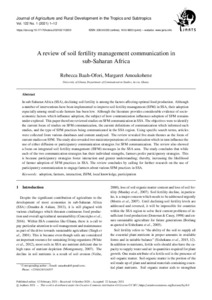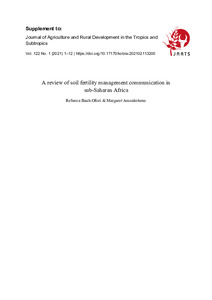A review of soil fertility management communication in sub-Saharan Afrika
| dc.date.accessioned | 2021-02-17T08:27:58Z | |
| dc.date.available | 2021-02-17T08:27:58Z | |
| dc.date.issued | 2021-02-12 | |
| dc.identifier | doi:10.17170/kobra-202102113200 | |
| dc.identifier.uri | http://hdl.handle.net/123456789/12520 | |
| dc.language.iso | eng | |
| dc.rights | Namensnennung 4.0 International | * |
| dc.rights.uri | http://creativecommons.org/licenses/by/4.0/ | * |
| dc.subject | adoption | eng |
| dc.subject | farmers | eng |
| dc.subject | interaction | eng |
| dc.subject | ISFM | eng |
| dc.subject | local knowledge | eng |
| dc.subject | participation | eng |
| dc.subject.ddc | 630 | |
| dc.title | A review of soil fertility management communication in sub-Saharan Afrika | eng |
| dc.type | Aufsatz | |
| dcterms.abstract | In sub-Saharan Africa (SSA), declining soil fertility is among the factors a ecting optimal food production. Although a number of interventions have been implemented to improve soil fertility management (SFM) in SSA, their adoption especially among small scale farmers has been low. Although the literature provides considerable evidence of socioeconomic factors which influence adoption, the subject of how communication influences adoption of SFM remains under-explored. This paper therefore reviewed studies on SFM communication in SSA. The objectives were to identify the current focus of studies on SFM communication, the current definitions of communication which informed such studies, and the type of SFM practices being communicated in the SSA region. Using specific search terms, articles were collected from various databases and content analysed. The review revealed five main themes as the focus of current studies on SFM. The study also revealed two main interpretations of communication which in turn influence the use of either di usion or participatory communication strategies for SFM communication. The review also showed a focus on integrated soil fertility management (ISFM) messages in the SSA area. The study concludes that while each of the two communication strategies has their individual strengths, farmers prefer participatory strategies. This is because participatory strategies foster interaction and greater understanding; thereby, increasing the likelihood of farmer adoption of SFM practices in SSA. The review concludes by calling for further research on the use of participatory communication to engage farmers about various SFM practices in SSA. | eng |
| dcterms.accessRights | open access | |
| dcterms.creator | Baah-Ofori, Reecca Nanaa | |
| dcterms.creator | Amoakohene, Maragaret | |
| dc.subject.swd | Afrika | ger |
| dc.subject.swd | Subsaharisches Afrika | ger |
| dc.subject.swd | Bodenfruchtbarkeit | ger |
| dc.subject.swd | lokales Wissen | ger |
| dc.subject.swd | Teilhabe | ger |
| dc.subject.swd | Management | ger |
| dc.subject.swd | Kommunikation | ger |
| dc.type.version | publishedVersion | |
| dcterms.source.identifier | EISSN 2363-6033 | |
| dcterms.source.issue | No. 1 | |
| dcterms.source.journal | Journal of Agriculture and Rural Development in the Tropics and Subtropics (JARTS) | eng |
| dcterms.source.pageinfo | 1-12 | |
| dcterms.source.volume | Vol. 122 | |
| kup.iskup | false |
Dateien zu dieser Ressource
Das Dokument erscheint in:
-
Vol 122, No 1 (2021) [13]



